That settles it…he’s walking around with a certain aesthetic impairment…Saltburn is a painful film to sit through…it is…really.
N.Y. Times Kyle Buchanan (boldface) to Scott & vice versa:.

HE’s Saltburn review out of Telluride:
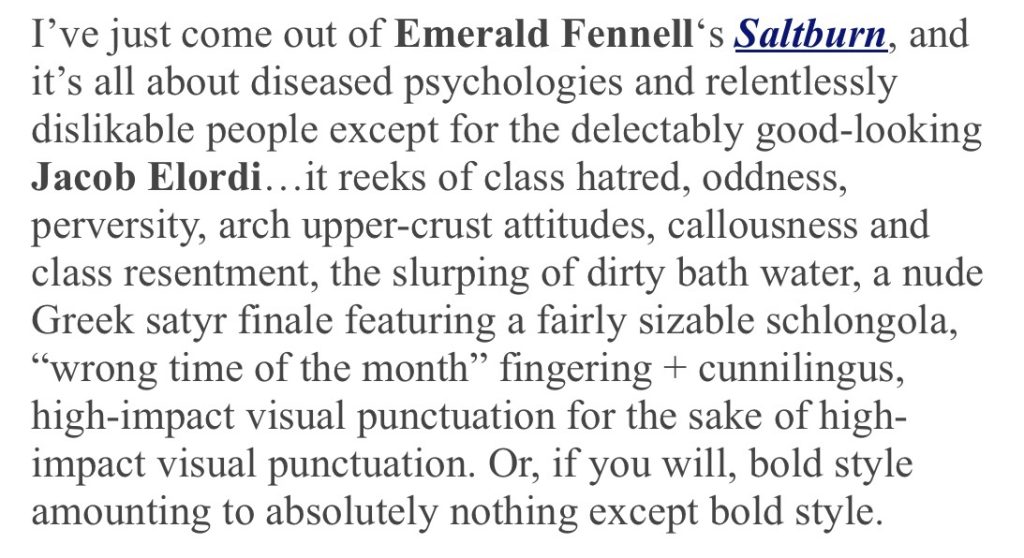
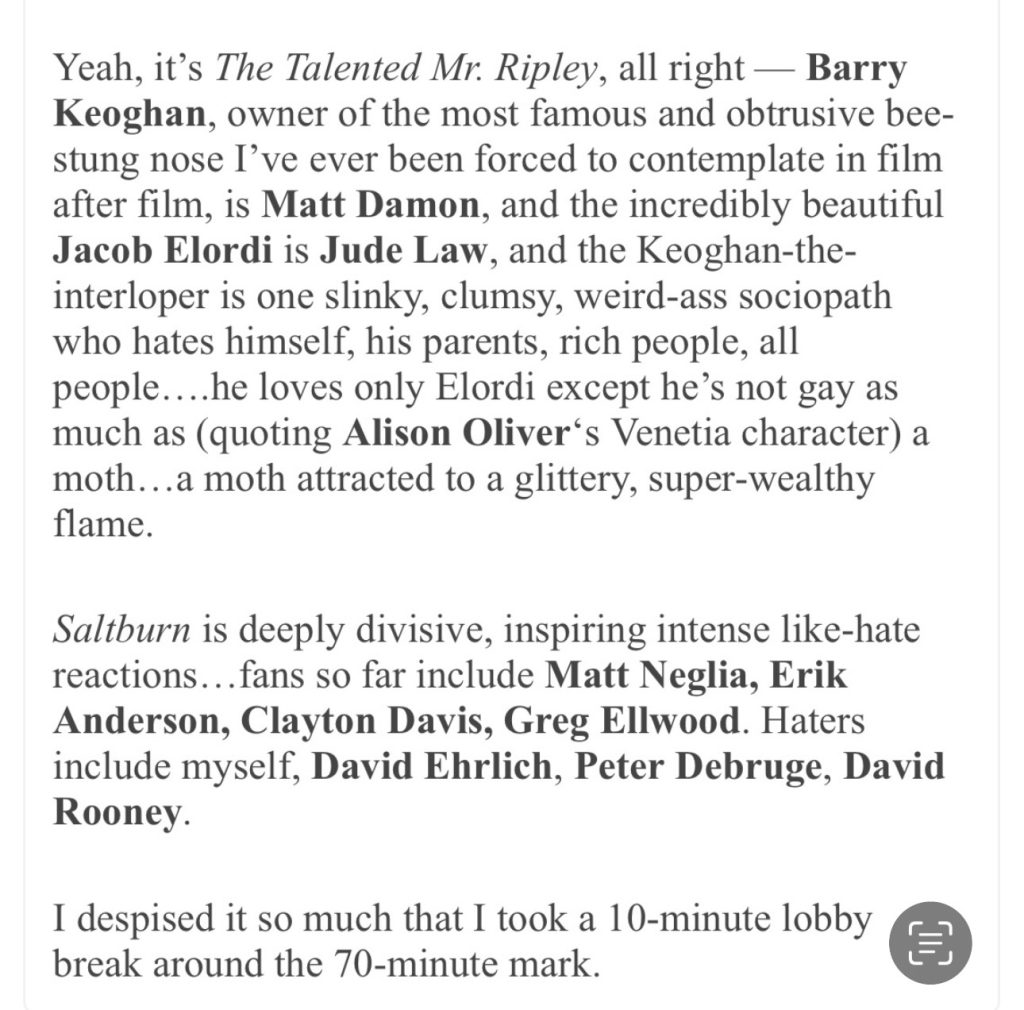
That settles it…he’s walking around with a certain aesthetic impairment…Saltburn is a painful film to sit through…it is…really.
N.Y. Times Kyle Buchanan (boldface) to Scott & vice versa:.

HE’s Saltburn review out of Telluride:


At age 86, is Gladiator II director Ridley Scott a reliable narrator of his own personal experience? And if so, could the 1977 Cannes Film Festival jury have been as whorish as the Golden Globes were reputed to be in the bad old days?
In an 11.7 N.Y. Times interview with Kyle Buchanan, Scott claims that his 1977 debut film, The Duellists, a competition entry, was on track to possibly win the Palme d’Or, or at least that jury chairman Roberto Rossellini told Scott that he wanted this to happen.
Alas, Scott recalls, Rossellini confided that the jury had rejected The Duellists “because somebody in there [had] bribed the committee” (which included New Yorker critic Pauline Kael) to give the big prize to Paolo and Vittorio Taviani’s Padre Padrone…”money had been chucked in at the top.”
Scott doesn’t mention that the jury handed The Duellists, which Scott had directed at age 39, a special “Best First Work” award.
I don’t believe Scott’s tale but you tell me.
From Buchanan’s article:
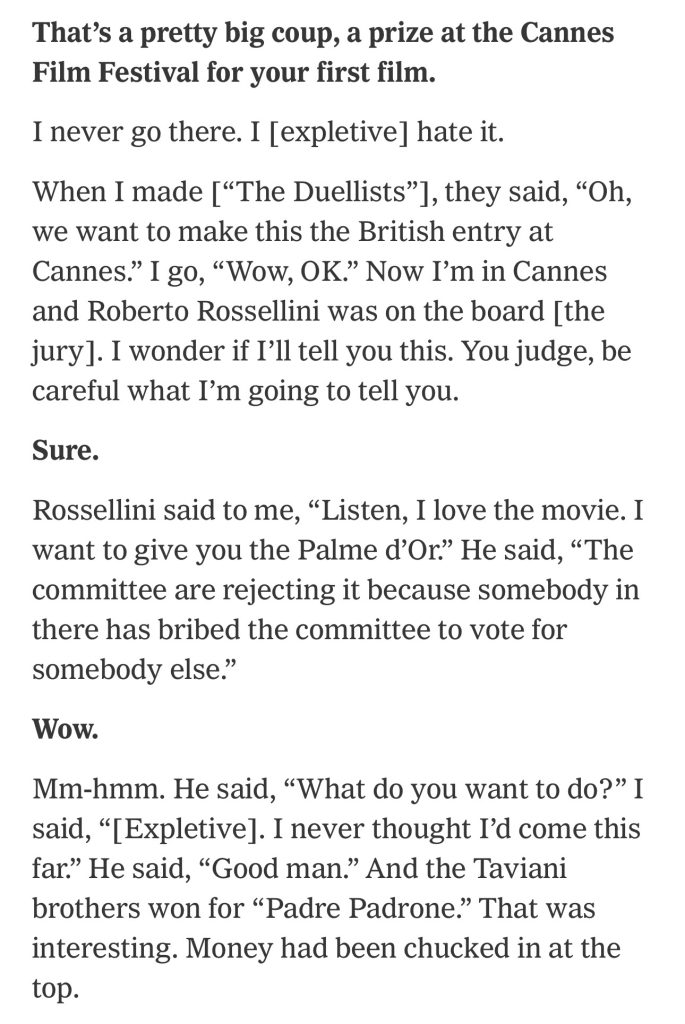
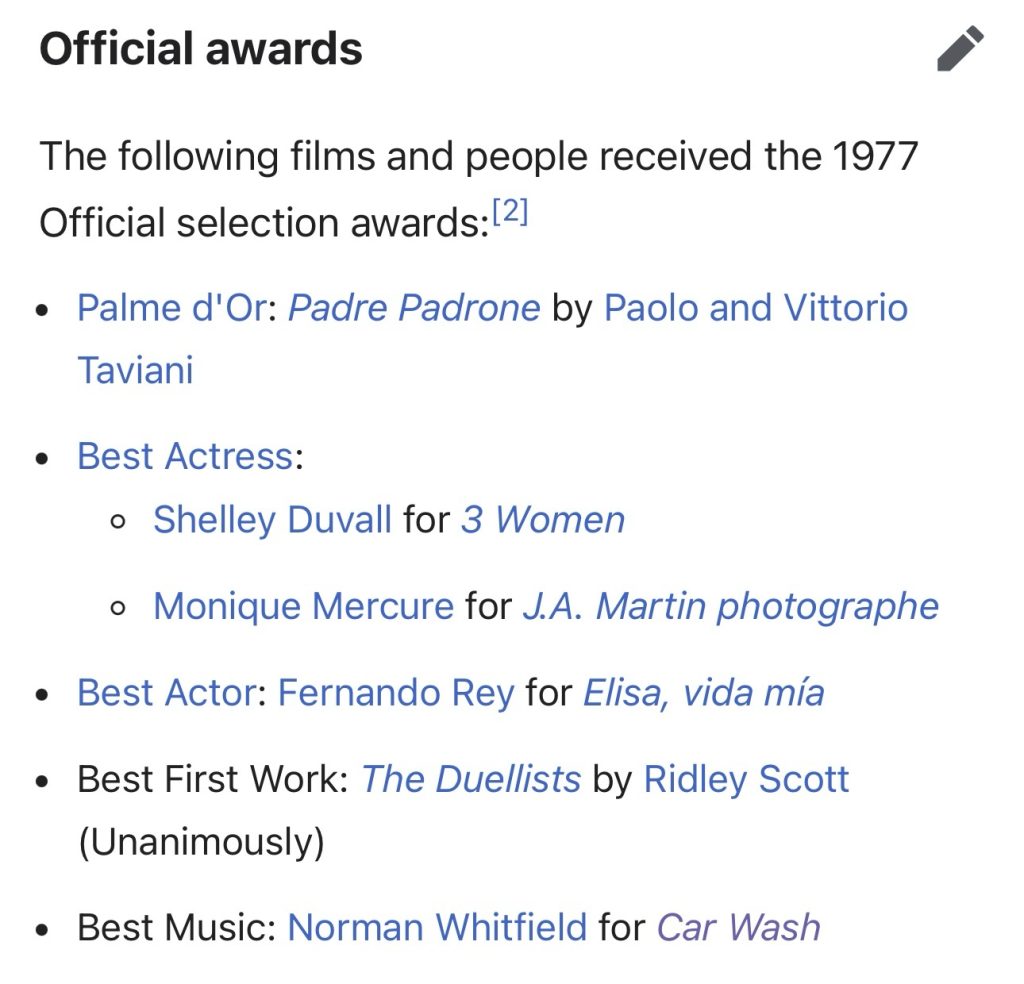
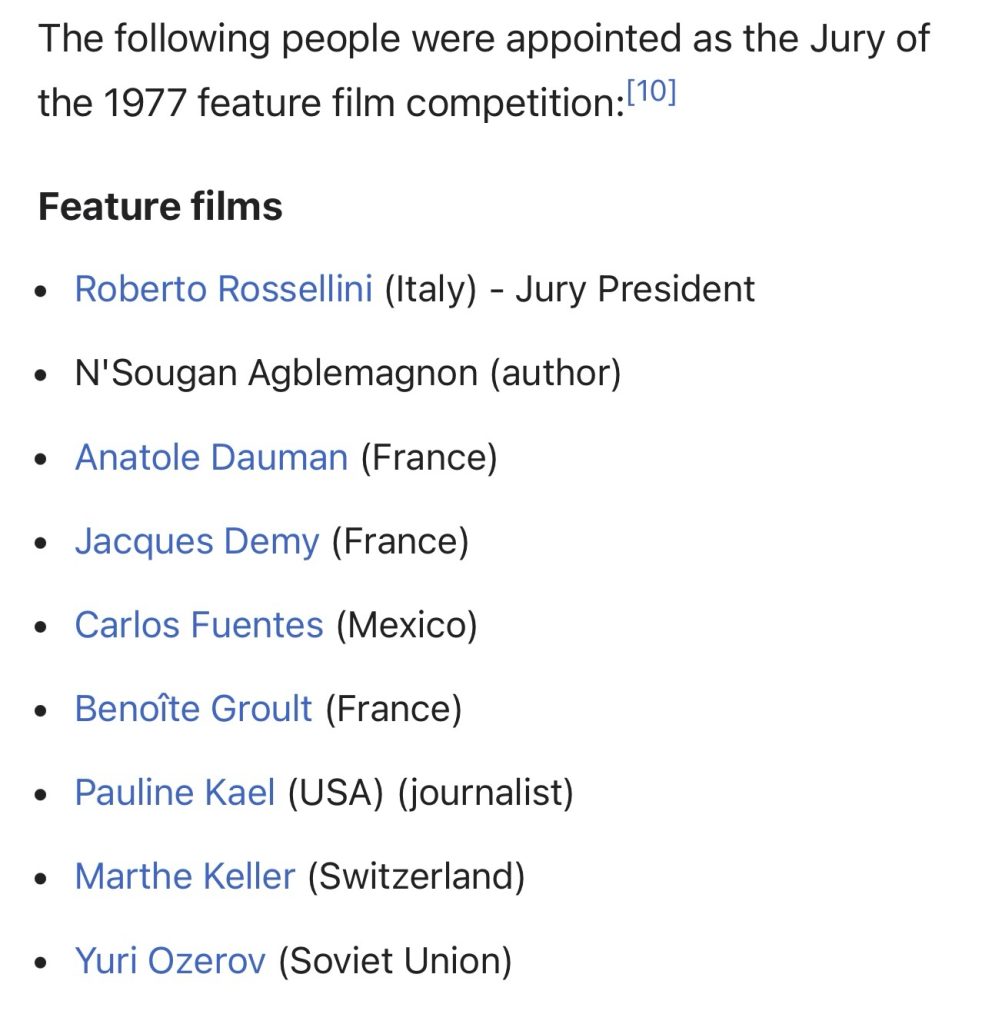
Jordan Ruimy recently polled over 100 name-brand critics and columnists (myself included) about the best films of the first half of the 2020s.
And as you might expect, the top five picks were mostly dreary or cerebral or vaguely punishing in a film-dweeb way. Mainly because the critics are status-quo sheep.
Christopher Nolan‘s Oppenheimer, which I respected but didn’t especally enjoy (my legs and my soul groaned in anguish) tallied the most votes. The first runner-up was Todd Field‘s TAR, which I saw four times without ever really tumbling for…it kept pissing me off.
In third, fourth and fifth place were The Daniels’ utterly infuriating Everything Everywhere All at Once (hated it with every fiber of my being), Ryusuke Hamaguchi‘s Drive My Car (too many Parliament cigarettes) and Jonathan Glazer‘s The Zone of Interest (an austere one-trick-pony).
The second five (#6 through #10) were Justine Triet‘s Anatomy of A Fall (a good film but kind of a slog to sit through, and I really hated that little cloying kid), Jane Campion‘s The Power of the Dog (effing despised it), Yorgos Lanthimos‘ Poor Things (yes! — the only film among the top ten that I really liked), Celine Song‘s Past Lives (fuck you) and Paul Thomas Anderson‘s Licorice Pizza (HE-approved with sight reservations) came in ninth and tenth.
I wasn’t a huge fan of the films that placed 11th and 12th either — Martin McDonagh‘s The Banshees of Inisherin and Emerald Fennell‘s Promising Young Woman.
HE’s top five films of the 2020-2024 period are Roman Polanski‘s J’Accuse (which premiered in Europe in late ’19 but wasn’t pirated for U.S. consumption until early ’20), Sean Baker‘s Anora, Steve McQueen‘s Mangrove, David Fincher‘s The Killer and Pedro Almodovar‘s Parallel Mothers.
My #6 thru #10 are Steven Zalllian‘s Ripley, Reinaldo Marcus Green‘s King Richard, Edward Berger‘s Conclave, Tran Anh Hung‘s The Taste of Things (The Pot au Feu) and Guy Ritchie‘s The Covenant.
Other HE faves: Maestro, The Holdovers, Happening, Quo Vadis, Aida?, The Pigeon Tunnel, The Apprentice, La Chimera, Riders of Justice, Spider-Man: No Way Home, The Worst Person in the World, The Beatles: Get Back, R.M.N., Bardo, The Trial of the Chicago 7, The King of Staten Island, The Trip to Greece, The Wild Goose Lake, Nomadland, In The Heights, West Side Story, Blackberry. (21)
I’d forgotten how effective the finale of To Die For is, and what a collossal dumbass Nicole Kidman‘s Pamela Smart** was depicted as. And especially what a blood-chilling vibe David Cronenberg had. That voice, those executive duds, that smile.
For me the second all-time creepiest movie assassin is that burly, 60ish, working-class Crimes and Misdemeanors guy from New Orleans who knocks on Anjelica Huston‘s Manhattan apartment door and says “flowers!”
Director Gus Van Sant was peaking like a sonuvabtich when TDF opened in October 1995. His greatest ever film, Drugstore Cowboy, which Gus directed at age 36 and cowrote with Daniel Yost, had opened six years earlier. And then came the totally gay My Own Private Idaho (’91). Let’s forget Even Cowgirls Get The Blues (’93), but two years after To Die For Gus directed Good Will Hunting (’97), another major score in terms of box-office and awards.
Let’s forget the misbegotten Psycho remake (’98) and the altogether dreadful Finding Forrester (David Poland loved it!).
But soon after came the brilliant bare-bones trilogy of Gerry, Elephant and Last Days. Paranoid Park was pretty good, I felt, although Gus’s Milk (’08) couldn’t hold a candle to Rob Epstein‘s The Times of Harvey Milk (’84). I never thought Sean Penn was the right guy to play Harvey — he’s way too short for one thing.
So Gus’s peak period lasted just shy of 20 years…commendable.
** The real Pamela Smart wasn’t murdered by a smooth assassin. She’s serving a life sentence inside the Bedford Hills Correctional Facility for Women.
Countless times in my car I’ve listened to Philip Glass‘s score for The Fog of War (2003). It’s techno that haunts, unnerves, and instills a certain creepy, ominous feeling, and yet is oddly soothing and even moving at times. If you really let it in, I mean.
Two decades ago Morris’s landmark doc won the Best Feature Documentary Oscar. (Technically in early ’05.) But Glass’s score wasn’t even nominated.
Without Glass’s existential ennui The Fog of War, which is entirely about and entirely narrated by former Defense Secretary Robert S. McNamara, who served between ’61 and ’68, would mostly be an arid thing…analytical, data-ish, egghead-ish. But Glass’s music, operating on its own plane, delivers great, twirling, surging, rumbling currents of emotional anxiety, and is the reason The Fog of War won the gold statuette.
The Fog of War is about a brilliant, analytical guy who passed along orders that brought about tens of thousands of bombing deaths in Vietnam in the mid to late ’60s, and was part of a mechanism that fire-bombed much of Japan in the the mid ’40s, and yet it gets under your skin in a very unusual way. It almost makes you cry here and there.
So that’s what I often do when I’m driving around. I listen to Glass’s score and occasionally taste the welling of stuff that’s been churning inside for decades.